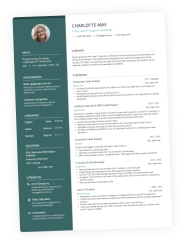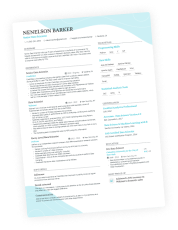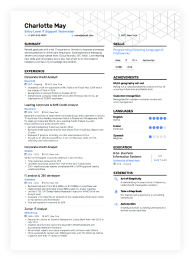Throughout your entire career, you've never zoned off or nodded along during a team meeting.
Even when your manager goes on and on for hours about the importance of filling in your time sheets.
Everyone wants to know what's your super-secret formula for success.
It's simple - you've active listening skills that are on point.
Active listening skills and techniques allow you to be a good listener and pay attention.
A gift, essential for communication in any setting, your ability to listen (actively) has helped you grow as a professional.
Moreover, recruiters are constantly looking for candidates with well-developed communication and listening skills.
How do you go about quantifying such an abstract skill - that is, active listening - across your CV?
Within this Enhancv guide, we'll show you:
- Active listening skills - the final spark for effective relationship-building;
- "When can you start" - why active listening skills are your best competitive advantage to landing the job;
- Professional success - backing up your active listening talents with tangible results;
- How to define your active listening abilities across different sections of your CV;
- Let's get creative - thinking outside the box about your active listening skill set.
What are active listening skills?
Active listening seems like an easy soft skill (or interpersonal communication trait) to master. This skill allows you to participate in a conversation or interaction by:
- carefully (and fully) focusing to give the speaker your undivided attention;
- understanding, analysing and comprehending what the other person is saying;
- engaging by asking appropriate questions and providing feedback when the speaker is done.
Put simply - you're hearing what the person is saying and are responding appropriately, trying to understand the unspoken message.
Active listening means you're making a conscious effort to genuinely paying attention via:
- Active verbal listening - asking open-ended questions for clarification, sharing similar experiences, repeating and restating the words and feelings you've heard, etc.
- Non-verbal cues - showing you're following allowing, without having to say so: smiling to show agreement, making eye contact, observing body language and facial expressions, etc.
Do you think building your active listening skills is easy? Not really. How often do you:
- space out during talks;
- judge others for their opinions;
- interrupt speakers and then have to apologise for it.
What is more, we tend to sometimes listen to respond rather than to understand. Active listening means you've put your vision on hold while aiming to clearly and attentively understand what is conveyed across.
Ultimately, active listening allows you to:
- retain and recall details of the conversation;
- resolve problems in advance;
- make more meaningful and deeper conversations.
You approach communication with empathy and an open mind, thus making the speaker feel respected and heard.
To say that a person feels listened to means a lot more than just their ideas get heard. It’s a sign of respect. It makes people feel valued.
Why is active listening wanted by recruiters on your resume
Active listening skills may come in handy in plenty of workplace situations: from one-on-ones with your manager to handling customer complaints.
Some people are born as empathic listeners. The good news is that the more you practice active listening, the better you become at it.
Here's why employers care about your active listening skills. Including this key skill on your CV means that you:
- can communicate effectively - what is more, you react appropriately to the needs of colleagues, clients, and customers;
- can understand and follow instructions - you take time to consider things over and listen with patience;
- can give and receive feedback - instead of being uncomfortable with criticism, you look at ways to feed-forward;
- are curious and a quick learner - by retaining information, you've learned, you're more susceptible to absorb new topics, concepts, and subjects;
- don't miss critical information and reduce misunderstandings - asking questions, acknowledging different perspectives, and reading communication cues allow you to see the invisible opportunities in any communication;
- resolve problems and conflicts - you're able to catch nuances others may not be able to by dedicating your full attention to the conversation at hand.
PRO TIP
Active listening is also a vital skill for those in senior management and leadership. It allows them to better understand their role and have a bird's eye perspective on the overall organisational vision, structure, and mission.
Here are four more reasons why active listening skills are important to organisations. They help to build:
- Trust within teams;
- Stronger and healthier work relationships;
- More productive environment;
- Happier workplaces.
What skills, activities and accomplishments help you highlight your active listening
Active language is one of those transferable soft skills. What this means is that you're able to apply across different roles and industries, yet it's more difficult to quantify.
That's why you could select specific skills and achievements to best describe your active listening skills.
Here are some of the skills, linked with active language, that are on recruiters' checklists:
- Reflection - you evaluate the speakers' information, emotions, and intentions to better understand their key message. Active listening allows you to summarise what you have comprehended from the conversation. Within your CV projects section, detail instances where your ability to reflect and confirm information has encouraged others to speak more freely.
- Asking questions - using open-ended questions allows the speaker to further elaborate. What is more, the need for clarification reassures them of your genuine interest and that everyone remains engaged in the conversation. If it's relevant for the job, detail roles where you've had to interview people and how your ability to ask the correct questions (at the right time) has created meaningful connections.
- Attentiveness and observation - the ability to remain concentrated or focused on the words, expressions, and body language of the speaker. You're stuck within the moment, building a more working relationship. This particular skill set also has to do with your attention to detail. On your CV, select instances where you've picked up crucial nuances in the conversation to achieve organisation-wide success (e.g. noticing client patterns during communication and implementing those to affect product sales).
- Patience - when communicating with you, your colleagues know that they won't be judged, interrupted, or bickered with. By actively listening to their perspectives, until the very end, you not only show understanding, but confidence in their opinions. Demonstrate how you've created a safe space for your team by remaining silent and allowing them to express their thoughts.
- Compassion and empathy - when listening, you aim to relate to the feelings, experiences, and mindset of others. The way you come across is friendly, and you always remain curious to listen and understand the situation at hand.
- Positive body language - showing that you're 100% invested in the conversation, you may maintain eye contact, nod along, smile in approval, etc. Showcase your ability to actively listen during a conversation with non-verbal cues during your interview.
- Conflict resolution and problem-solving - sometimes the best (and most balanced) solution to resolve a conflict or problem is to take a step back and listen. This allows you to identify and address the real challenges at hand. Use experience items on your CV where you've observed the situation and listened to different perspectives to provide an unbiased resolution.
- Time management - listening allows you to understand what are the task priorities, allowing you to better organise your workload. Illustrate how you manage your time using your CV experience: from how you process the information to completing the tasks. Always make sure to include tangible results, when talking about your active listening and time management skills.
- Request, provide, and implement feedback - this skill set is linked with finding the right moment and right time to deliver and receive feedback. It's particularly vital to allow the speaker to first finish sharing their ideas and then, if asked, to disclose your perspective. Highlight how you've integrated feedback into your work to progress your professional capacities.
- Customer service and customer relationship management - you listen and understand what the customer wants and needs. Selecting bespoke, tailored solutions to their problems allows you to build trustworthy and healthy communication. Within the CV summary, quantify your work ethic in terms of customer communication. What are some of your mantras or ways to deal with external stress?
- Leadership and decision-making - active listening allows you to be a better communicator, more influential and trustworthy leader. You're able to make more effective decisions based on different perspectives. If you have leadership experience, include on your CV instances of how you communicate and lead your team ahead to achieve results.
How to demonstrate active listening on your CV
- Assess the job advertisement to discover keywords and phrases linked with active listening. Tailor your CV to reflect upon your proficiency in those specific requirements to make a good first impression.
- Sprinkle active listening keywords across different sections of your CV to help with the Applicant Tracking System (ATS) assessment of your profile. Companies use the ATS software to prequalify candidates based on job requirements.
- Use active listening synonyms across your CV to avoid repetitions. You could qualify your ability to observe, assert the situation, and understand complex problems.
- Ensure you've listed your achievements via active listening, whether that's an increased percentage of customer satisfaction, more problems resolved, optimised work processes to save time, enhanced profit margins, etc. Your active listening skills have probably played a quite major role across your career, so make sure to quantify this.
- Don't just say you have active listening skills, but provide further proof in the form of stories to showcase your talents. For example, you could detail how you've followed instructions for success; earned clients' trust by understanding their problems; and supported company growth by showing care and empathy to your co-workers' opinions.
Example 1: Demonstrate active listening in the experience section
- •Calmly and patiently addressing customer inquiries, ensuring each interaction was tailored to the individual's needs, resulting in a 95% customer satisfaction rating
- •Asking probing questions to fully understand customer issues, leading to a 15% increase in first-call resolution rates
- •Attentively engaging with customers, summarising their concerns, and providing accurate solutions, leading to a 25% decrease in follow-up inquiries and improved overall service quality
- •Actively sought and implemented customer feedback to enhance service processes, resulting in a streamlined support system that increased efficiency by 30%
The best way to create your experience section is to include instances where active listening was instrumental to your success:
- Select from three to five skills;
- Keeping one skill per bullet;
- Start with an action verb;
- Add statistics to prove your achievements.
PRO TIP
You could also use the STAR method to describe a Situation and explain the Task; what Actions you undertook via active listening; and your Results.
In the example above, the help desk representative has described the following skills:
- Patience - leading to better customer satisfaction;
- Asking questions - interacting with clients to achieve overall company growth;
- Active listening - improving overall team performance;
- Feedback - understanding clients' needs to improve efficiency.
If you happen to have any leadership, mentorship, coaching, or mediator experience, make sure to list how active listening has helped you improve your teamwork and communication style.
Example 2: Demonstrate active listening in the CV summary section
Your CV summary is one of the first sections, which recruiters will notice. That's why it needs to highlight your most noteworthy achievements, linked with active listening.
You should be aiming to showcase how your particular skill set would benefit your potential employers.
The year 3 teacher has quantified their skill set by showcasing how:
- Active listening has helped them create a more nurturing and supportive environment;
- Reflective teaching techniques have helped them adapt to individual learning needs;
- Flexible lesson plans ensured better student engagement;
- Strong professional relationships, built with active listening, are impacting positively the whole community.
Example 3: Show your active listening in your achievements sections
Within the CV achievements section, it's once again important to quantify your active listening skills via your most noteworthy and relevant success.
The project manager, in the example above, has:
- improved project efficiency by creating a healthy work environment based on active listening;
- reduced project delays by observing different perspectives to reduce conflicts;
- ensured their clients remained happy by understanding their needs and matching them to the best third-party vendors.
Example 4: Demonstrate the skill through other sections of your CV
Here are three more CV sections, within which you could feature your active listening skills:
- Certifications - include any communication, active listening, or interpersonal skills' training or workshops you've taken to enhance your ability to become a better listener. If you've any specific certification in coaching or mentorship, this could also hint at your ability to communicate effectively.
- Volunteering - when supporting the organisations you believe in, the ability to sit back, observe, and make decisions, based on what you've heard, is beneficial for everyone. Feature on your CV the causes you care about and how active listening has helped you support them.
- Awards - recognitions of your communication, teamwork, and listening proficiencies definitely could be featured on your CV. Just make sure they're relevant to the role you're applying for.
Active listening: key takeaways for your CV
- Active listening is one of those soft skills that’s a bit more difficult to quantify, yet it shows recruiters you’re a good communicator.
- Demonstrate your active listening skills using various other soft skills across your resume like ability to ask questions, patience, or summarise information. This approach would allow you to add more context to your ability to listen and understand conversations.
- Always link your active listening skill with a tangible metric - whether that’s a percentage, hours, or profit margins - to show your overall professional impact on the organisation.
- Quantify the impact you’ve made as a professional with active listening across different CV sections, e.g. summary, certifications, volunteering, etc.



